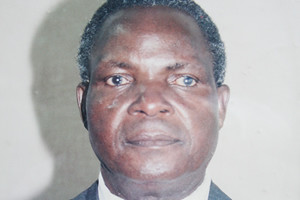
Veteran Zimbabwe journalist and government official Ezekiel Makunike has died in an accident. He was 83. His work has been praised by his colleagues in the Southern African state., a photo by Pan-African News Wire File Photos on Flickr.
Veteran journalist Makunike dies
Thursday, 21 June 2012 12:00
Herald Reporter
Veteran journalist and author Ezekiel Makunike has died. He was 83. Makunike died at The Avenues Clinic on Tuesday night after being hit by a car along Glenara Avenue North in Highlands, Harare, at around 5pm the same day.
Burial arrangements will be announced in due course.
The family is also waiting for his son who is in Senegal.
Family spokesperson Mr Ezekiel Mutasa said Makunike died a few hours after being admitted at The Avenues Clinic.
“He was hit when he was crossing Glenara Avenue on his way from the late Ambassador Jambwa’s house and was rushed to The Avenues Clinic.
“He was conscious when he was admitted at The Avenues, but he died a few hours later.”
Mr Mutasa described Makunike as a family man who was ever encouraging.
“He was a wonderful person. He was ever encouraging and always cheerful,” he said.
Veteran journalist Kindness Paradza described Makunike’s death as a huge loss to the country and the journalism fraternity.
“I am one of his early students and we have lost a good man who gave us guidance throughout.
“We have been consulting him on several issues regarding the journalism profession and it is sad that we have lost him at a time when we needed his attention on many things in the journalism industry,” said Paradza.
Makunike was born on August 7, 1929 in the Nyakatsapa area under Chief Mutasa in Manicaland.
He went to the then Old Umtali Mission in 1944 and later Old Mutare American Methodist School.
He also attended Goromonzi Government School between 1951 and 1954.
In 1959, the year he married his wife Ella, Makunike won a scholarship to study journalism at Hislop College, Nagpur University in India in 1960 where their first two children, Chido and Batsirai, were born.
It was during that time that he obtained a BA degree in Political Science and a Diploma in Journalism.
Upon his return in 1965, he was appointed director of Methodist Publications and Communications during which time he also edited Umbowo — the church’s monthly paper.
In 1970, as the editor of Umbowo, Makunike published his most daring editorial comment in which he called for the then Prime Minister Ian Smith to be tried in court.
The editorial shook the foundation of white supremacy and the edition was sold out, leading to a reprint.
That comment placed Makunike under Government surveillance and he had to escape to Zambia after a tip-off that police were after him.
Makunike was appointed the first African director of the African Literature Centre for Journalism and Art training at Kitwe’s Mindolo Ecumenical Foundation, Zambia, in 1973.
At independence in 1980, the then Ministry of Information, Posts and Telecommunications invited him to be the founding director of the Zimbabwe Institute of Mass Communication.
In 1981, he was appointed the founding director of the Zimbabwe Institute of Mass Communication, now the Division of Mass Communication at Harare Polytechnic.
Makunike also served as the director of information in the Ministry of Information, Posts and Telecommunications until his retirement in 1989.
Having made his exit from active and mainstream journalism, Makunike concentrated on his community life improvement project on a one-hectare plot.
He wrote the book “I won’t call you Sir” among other titles.
He is survived by his wife Ella, four children and four grandchildren.
No comments:
Post a Comment